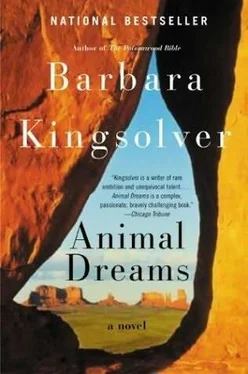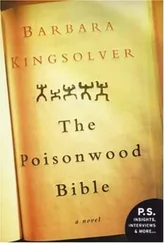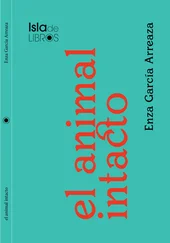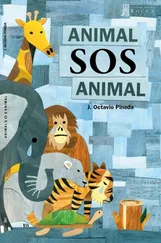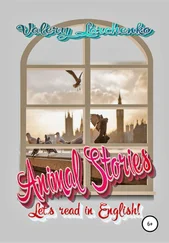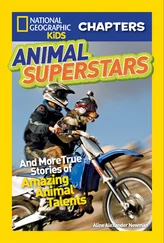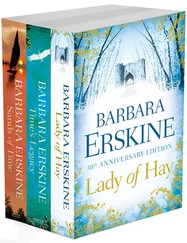“I am. You’re not.” She started to clear the table with one hand. “Every minute in the presence of a child takes seven minutes off your life.” I took the baby from her and she said, “Don’t say I didn’t warn you.”
“They’re your treasures, Em. You’ve got something to show for yourself.”
“Oh, yeah. I know,” she said.
The baby’s name was Nicholas, but nobody called him anything but “the baby.” I’d read somewhere that the brain organizes information in sets no larger than four-that’s why Social Security and phone numbers are subdivided; possibly four children’s names were the limit on parental memory. I sat in the rocker and settled nameless Nicholas on my lap, his head at my knees. My long thigh bones exactly accommodated his length.
Emelina scraped toast corners into a blue enamel pail and ran a sinkful of hot water. “I don’t think I could stand to let Mason go off to kindergarten next year if it wasn’t for the baby. It kills you to see them grow up. But I guess it would kill you quicker if they didn’t.”
“I remember you saying you were calling it quits after four.”
“Famous last words.”
While I watched her move around the kitchen, my fingers tingled with the pleasure of stroking the baby’s fine black hair. It was longer by several inches than his big brother John Tucker’s; someone had taken shears to that boy with a vengeance. Probably Emelina. A woman who beheaded her own chickens would cut her kids’ hair herself.
Emelina washed and rinsed the plates and set them into the wire rack to drain. I sat feeling useless, though Nicholas seemed comfortable and was falling asleep on my lap. When that happens you feel them grow heavier, as if relaxation allowed them to be flooded with extra substance. A constriction ran across my lungs. I’d come close to having a baby of my own once, but I thought of it now so rarely that the notion of myself as a mother always caught me off guard.
In spite of the heat outside, Emelina’s dishwater was fogging the window. A little collection of potted plants stood in a row on the windowsill. Prayer plants. I was struck with a sudden, forceful memory of Emelina’s grandmother’s house. Hallie and I called her Abuelita too, though of course she was no relation, and the old woman called us “the orphan girls,” huérfanas. Nobody ever thought we could understand Spanish. The house had a stale, old-lady smell, but we loved her boxes of “pretties”: cast-metal carts with broken wheels, lead soldiers, huge washers and carriage bolts, every species of unidentifiable metal part. Her dead husband was a blacksmith. There were also boxes of ancient dress-up clothes in satiny fabrics as brittle as paper. Our best playroom was the sunny alcove crammed with plants where we stalked lions through the parlor palms, dressed in our finery, more glamorous than Beryl Markham and the Baroness von Blixen could have managed to be in their dreams. We confronted real dangers in the form of rickety iron stands holding heavy, breakable pots and fragile plants. The African violets were furred like pets, and the prayer plants had leaves like an old woman’s hands, red-veined on the back, that opened wide in the sun and folded primly together in the shade. Abuelita instructed us to sit and watch them, to try and catch them in the act of closing their leaves. Hallie always waited the longest, patient for enlightenment long after Emelina and I had returned to our rowdy diversions.
“You know, I’m so used to J.T. being gone,” Emelina said, bringing me back. “I think he’d be underfoot if he were here. I’d give us about ten days, then I’d probably shoot him. Husband murder in Grace, oh boy.” She seemed to be answering a question, however circumspectly, that I wasn’t sure I’d asked.
“How long has he been on the railroad?”
“Just since the mine shut down, which was…” She frowned at the glass she was drying, decorated with white pigs in red bow ties. “Ten years, about.”
“They used to always say they’d hire again up there when the price of copper went up.”
“Well, you know, that’s talk. Nobody’s waiting around anymore, Now it’s pecans and plums. And the railroad, thank God for that. I think we could live off the orchards if the boys didn’t eat like horses and outgrow their shoes every ten days. Get this, now they’re too fashion conscious to wear each other’s hand-me-downs. Remember when boys didn’t give a shit what they wore? We never should have got satellite TV.” She turned around, drying her hands on her apron. “Is that rascal gone to sleep? Thanks. Codi. I’ll take him upstairs and put him down for his nap.” She lifted the baby onto her shoulder like a sack of valuable flour. “You got big plans for today?”
“I thought I’d make an excursion into the city,” I said. “Check out the dry goods at the Baptist Grocery.”
She laughed. “If you can wait awhile I’ll go with you. Grammy can listen for the baby. She ought to be home pretty soon from her meeting.” Emelina rolled her eyes as she left the kitchen. “Stitch and Bitch Club on Mondays, bright and early.”
I stood at the window looking out at the grove of trees that ran the length of the canyon. Plum, pear, apple. And quince, I believe, though I couldn’t identify a quince tree to save my life. I only remembered the word because of the way people here pronounced it-“queens”-with their Spanish-influenced vowels. In the distance I could make out white satellite dishes perched among the cacti on the red cliff-one to each house, like dogs. Well, that was something new. The sky was overcast. In the orchards on the other side of the river I could see men working among the trees. I remembered them beating the branches with long poles, bringing down scattered showers of pecans. Frailing, that was called. In the older orchards sometimes they had to climb up into the tallest trees to reach the upper branches with their poles. But it was too early in the year for that. Pecans didn’t ripen till late fall.
Hallie and I had played in this house once or twice as children, when a pair of pigeon-toed girl cousins of J.T.’s had lived here. Now it belonged so securely to Emelina. It was hard to realize how fully life had gone on. Of course, it would. I could have stayed here, or gone away as I did, it made no difference to Grace.
I washed the baby’s cup, running my finger around the inside rim. While the sun left the windowsill and moved on to other things, I noticed, the prayer plants had closed up when I wasn’t watching. They stood in a self-satisfied row, keeping their thoughts to themselves.
“You keep some of the dirt on them, and you just stuff them down in paper bags and keep them somewhere dark,” said Lydia Galvez. “Do you have a root cellar?”
“No, uh-uh. We did, but the boys got into it and figured out how to cave it in some way,” Emelina said.
“Well, you could put them anyplace dark. The bottom of a closet would do.”
Lydia Galvez was the wife of John Tucker’s little league coach. I’d been introduced. We’d discussed John Tucker, baseball, and Emelina’s talent for producing boys. The whole town had been betting this last one would be a girl, Lydia Galvez told me. Now they were talking about dividing gladiolus bulbs.
“I’ve got some black,” Lydia was saying. “Do you have any black? I could spare you some. They’re not a true black, I’d really call it purple, but they’re supposed to be important.”
Emelina gave me a glance, so I knew she was trying to wind things up. Our whole afternoon had gone pretty much this way. Lydia, like everyone else, had no earthly notion of what to say to me, or I to them; I rarely even remembered who they were. But we were all polite, as if I were Emelina’s lunatic maiden aunt.
Читать дальше
